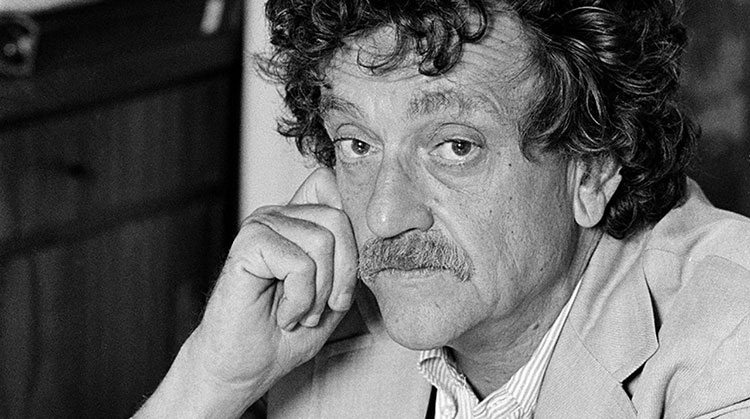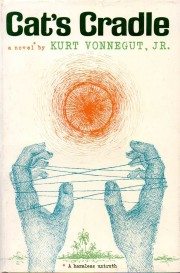Busy, busy, busy.
Cat’s Cradle, Kurt Vonnegut’s landmark 1963 novel – like most other Vonnegut works – is an exercise is genre-bending. It meshes history, religion, politics, and a dash of science fiction. No damn cat, and no damn cradle!
Vonnegut’s gift of absurdism is exactly what makes this novel so good (and deeply profound in its own way). If Vonnegut had favoured a serious, heavy approach over the witty, seemingly effortless and lightly satirical touch that this book is written with, we would have had another boring old story full of rights and wrongs and and nothing new to offer. It is, instead, irreverent and with liberal helpings of irony and stony, low-key humour. That’s the greatest thing about Vonnegut: he never takes himself too seriously. And he trusts his readers enough to read into his story without spelling everything out for them.

Of course, one would do this book a disservice by not mentioning Bokononism. The Calypso’s, in particular, are enjoyable: ‘Tiger got to hunt, bird got to fly; Man got to sit and wonder, ‘Why, why, why?’ Tiger got to sleep, bird got to land; Man got to tell himself he understand.’
In typical Vonnegut fashion, Cradle forgets itself at times and takes liberties on the narrative front. Vonnegut is a master of the effortless plot-twist, and he’s an expert when it comes to putting readers on their toes. There are things you absolutely do not see coming.
Cat’s Cradle was my first ever Vonnegut. I still remember the initial befuddlement I felt when I first started reading the book. We started off with Jonah, and, being as yet unaccustomed to his style, I first expected it to be a book about Jonah. What I got instead, of course, was a book that was more about everything and everyone else – the Hoennikkers and the Castles and Monzanas and Crosbys and Mintons, San Lorenzo, religion, the End of the World – than about Jonah himself. The reader does not know Jonah at all.
The End of the World is a topic interesting enough on its own; and, depending on how its handled, a laughably bad or an immensely brilliant basis of the story. This book falls in the latter category: the wonderful thing about Cat’s Cradle is that, though the book starts off with the writer documenting the ‘End of the World’, it is not until the end that you see the actual End coming. And even then, it’s not what you would expect.
If you can get over the initial sense of slight incredulity, this book will truly stand out as the brilliant read it is. If you don’t take this book too seriously, you will at once get more out of it, and what’s more, you will find it profound too. Its deceptively light, not-too-serious tone underlies its real depth and meaning.
Psst! Our free newsletter offers the greatest and the smartest ideas, essays, books and links in one convenient place. The emails you receive will be short, smart, and always interesting. Sign up here >>


